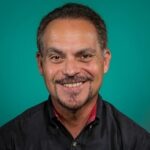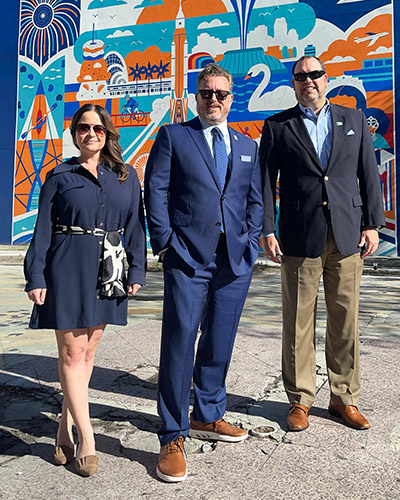
Featured Stories – Recipe for Success
RECIPE FOR SUCCESS
Lastik and Nelson provide almost 50 years of combined experience

By George Diaz
Brent Nelson and Jennifer Lastik have stories to tell. Wonderful stories, experiences and memories.
Their life experiences bleed over to professional experiences that have enriched their lives. World Cup events. March Madness. Wrestlemania. Olympic trials. MLS All-Star weekend. and so much more.
Their job descriptions have a definite sense and purpose: Securing sporting events for Orlando and its regional partners, establishing business relationships nationwide and globally, keeping those relationships, and chasing new opportunities.
Nelson is the senior vice president of business development for the Greater Orlando Sports Commission, charged with the attraction and retention of key relationships within the overall sports marketplace.
Lastik, as Executive Vice-President of the commission, oversees event logistics for a four-county region while managing business operations, the state grant program and event budgets. She plays an essential role in executing events to enhance Orlando as a sports destination.

They each have a personal journey filled with those memories mentioned above. Lastik, who has a Bachelor of Science degree in Sport Management at Slippery Rock University and a Master’s degree in Sport Management from West Virginia University, joined the commission in 2007, starting as the Orange County manager. She's evolved into five different roles since then.
Nelson goes back even further, to 1995, after his graduation from Florida State University with a B.A. in Marketing. Back then, the commission was a startup with only a handful of employees.
Things have gotten a bit busier since then incrementally. The commission now has nine full-time employees and two part-time employees.
In doing the math, Nelson estimates that he's had a role in more than 1,500 events staged in Greater Orlando sports venues and hotels. Lastik hasn't put in as many years to match those numbers for obvious reasons, but her fingerprints are all over events, including the recent March Madness NCAA men's basketball tournament at the Amway Center. Her current to-do list involves prep work for the United States Olympic marathon trials coming to this area in February of 2024.
But when you cut to the heart of the matter, all those details are secondary to the most important part of their job description:
Networking. Cultivating relationships and keeping them. Looking for other opportunities. A handshake, a phone call, a smile. Whatever it takes. Just ask Nelson.
"I was at a birthday party in South Florida, and someone asked: ' So when you say business development, what does that mean?'
"I go, 'Let me drill it down in the simplest form. I am a matchmaker. I'm taking the right event opportunities that make sense for this community and our stakeholders that reside within this community, and I'm trying to pair everybody up." Our batting average is pretty good when it comes to bringing the right piece of business to our region.' ''
Lastik concurs.
"When I first started, the majority of our events were smaller scale events, and we were not as integrated into the local community," she said. "I believe our involvement now with the community, both locally and statewide, and being able to collaborate with all of our partners has allowed us to win and host these marquee events, because the marquee events is really a team effort for the whole region.
"Now having all those relationships and network has allowed us to be successful in continuing to grow and host the higher profile events."
Their commitment and expertise has not gone unnoticed.
“A mentor of mine, Len Perna, preaches that ‘talent is the differentiator between organizations - it is the single most crucial ingredient for shifting the balance of power between organizations’ when speaking about successful organizations operating in highly competitive environments,” said Jason Siegel, President & Chief Executive Officer of the Greater Orlando Sports Commission. “We are very fortunate to have two very talented leaders with almost 50 years of combined experience within our organization who have an unparalleled work ethic, are extremely competent and committed to serving our community.”
Lastik, like Nelson, is involved in a gamut of events. She will be busy in May with a slew of NCAA championships, including Division II women's golf championships at Mission Inn Resort and Club. Of course, the Olympic Trials remain a priority moving forward.
It's a great "get" for Lastik and her team. Orlando will be the farthest south host in Olympic marathon trials history, displacing Houston, which hosted in 1992 and 2012. Orlando is also the first Florida city to be awarded the event. The top three men and women are expected to represent the United States in Paris.
"It's very exciting to work on, as well as very challenging to work on," she said. "It's a live broadcast on NBC. When you have all the eyes on you, you also have a lot of pressure. We're working with the City of Orlando and Track Shack on that, both great partners of ours. It's one of the largest events that we've all hosted."
As for her favorite, Lastik harkens back to her first March Madness run, in 2014. "That was one of my first marquee events, and it was also one of the first exclusive events at the Amway Center," she said. "It was a very fun and exciting learning lesson working with Orlando Magic and Orlando Venues on each aspect of that event."
Nelson remains highly nostalgic about one of the first events he was involved in with the commission: U.S. Bobsled team tryouts in 1995. There was no snow of course, but competitors had to push a 400-pound sled across 60 meters of a railed track set up along Church Street Station. Olympian Brian Shimer, a veteran on the bobsled track, was in town as well to help facilitate and coordinate the event.
"They were trying to uncover the next great bobsled team," Nelson said. "Of course, they were trying to do more than just recruiting from the professional ranks or the collegiate ranks. They said, 'How do we know we may not find somebody in Orlando that just comes off the street and was an elite athlete in whatever sport?" "The top number of individuals from Orlando got flown to Lake Placid to actually try out for the team."
Nelson and Lastik share one competitive advantage in working for the sports commission. Calling the Greater Orlando region home is a huge plus. But much like the sporting events they attract, it also involves teamwork.
"I think what makes us successful is we're a small company, but we're very, very close as well," Lastik said. "We hang out outside of work, and we really trust each other and want to help each other. Our relationships within the sports industry, as with any industry, make or break some of the aspects of the job, but our staff has years of relationships built within the industry that help us. We're very intentional about fostering those relationships and building new ones."
One of those relationships involves WISE – Women in Sports and Events. Lastik attended their women's executive leadership institute where she spent a week at Dartmouth with 30 other female leaders across the sports industry, including the NFL, NBA and MLS.
"It was great for professional development and learning," she said, "but also learning the challenges they were facing and how to overcome that. I was able to bring that back to the team to be a better leader..."
Armed with insights and greater knowledge, the matchmaking experience continues for Lastik and Nelson.
"In many ways we have such a solid foundation," Nelson said. "And then when you add in the formula for success with all that the community brings to the table, those are the things that add up. We want to aggressively continue to tell that story to event organizers not only regionally, but nationally, but also internationally as well."






